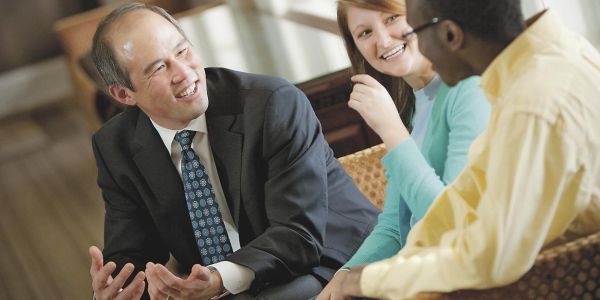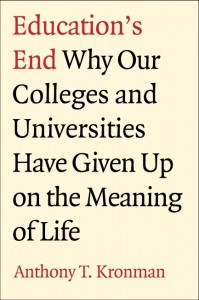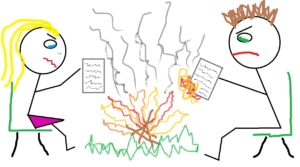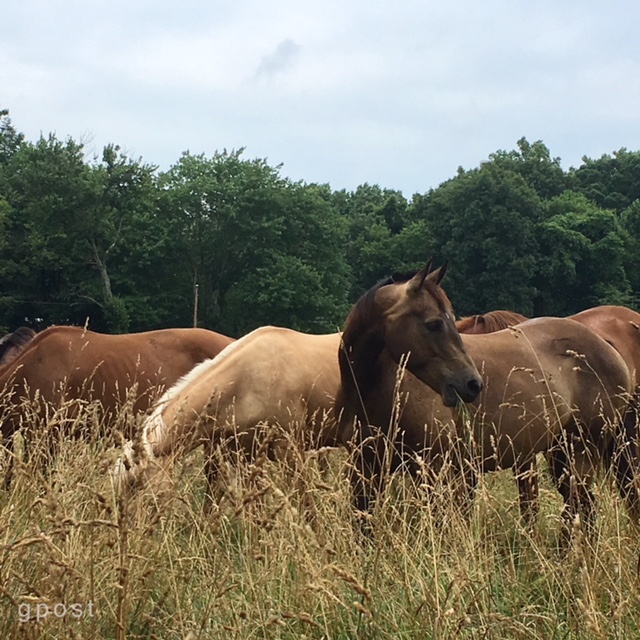
The heat makes everything slow down in July. Like these horses, who were excited to be let loose in a new grazing field, I’ve been slowing down and grazing on some new stories.
They argue that the stands we take on the job should be flexible, nuanced and generous—as opposed to their opposites. They counsel patience and the ability to hold competing perspectives at the same time. They build on topics that have been covered here before.
Here’s some of what I’ve been chewing on this week.
Commonly Held Views on What’s Good and Bad Are Always Evolving
As far as morality is concerned, we’re fish in a fishbowl.
We have an internal compass that determines which way to swim, when to open our mouths for food, what kind of fish we think we want to be. But we’re also in the water, in a bowl on a table, with light from a lamp or window coming in, and big faces that appear periodically above the rim or in front of the glass to look at us. As a fish, our vitality, beauty or even personality affect what happens around us as surely as the external environment we’re stuck in influences the choices that we make inside.
The first story is about how the music that we’re playing inside our fish bowl and the external forces that are judging its suitability can affect one another. It’s about American Christianity’s slow embrace of rock-n-roll, what it initially heard as “the sound of sin.”
How long it took the churches to move from condemnation to accommodation is chronicled in Randall Stephen’s The Devil’s Music. He begins with the extraordinary Sister Rosetta Tharpe, who blurred the lines between gospel and pop in the 1930’s, and ends in 2001 when Christian rock outsold jazz and classical music combined. How it eventually happened is suggested by the following quote from William Booth, the founder of the Salvation Army:
The music of the Army is not, as a rule, original. We seize upon the strains that have already caught the ears of the masses, we load them up with our great theme—salvation—and so we make the very enemy help us fill the air with our Savior’s fame.
When opposition persists, bridges between the sides get built and a middle ground with a new understanding of “what’s good” emerges. It rarely happens without pain, and usually takes a long time. If you’re interested, the link to Stephen’s book comes with a Spotify playlist that doubles as a soundtrack for rock-n-roll’s 60-year moral evolution.
In other areas, conflicting priorities between traditional religion and, say, minorities within their communities of faith, are still playing out. For example, the Mormons and the Anglicans have both subjected their LGBTQ believers to condemnation, shunning and banishment over the years. Two related stories this week come from inside these believing communities.
Places like Utah with its large Mormon population have unusually high suicide rates, particularly among young people. Some Mormons and former-Mormons have begun to insist that the seemingly irreconcilable tension between an individual’s sexual identity and his or her faith is one reason that young Mormons are taking their own lives.
A new documentary called “Believer” is about the rock band Imagine Dragons and its straight Mormon members who staged a concert in Provo, Utah last August to celebrate the LGBTQ members of the Mormon community. It’s not a great documentary, but the story behind how this massive public statement came together and the Latter Day Saints responded is consistently compelling. Both sides believe that they are championing a life or death issue (an individual’s sexual identity in this life vs. his or her eternal salvation). Moreover, individuals with personal stakes in the Church, like members of this rock band, are risking their own ostracism by trying to bridge the moral divide. The moral courage is palpable. The moral evolution is one step forward and one step back.
While several testimonials in “Believer” are moving, I wasn’t prepared for the gut-wrenching interview on BBC America with an Anglican woman who has been struggling with her faith and sexual identity for more than 30 years. It is impossible for me to describe her internal moral struggle as well as she gives voice to it; you have to hear it for yourself. It is also unclear how the Anglicans will respond. What is clear is that pain like this “from within their ranks” will be difficult to ignore and a catalyst for eventual change.
Today, where many of our moral commitments are shallow instead of deep, it can be difficult to imagine individuals who have not one but two life-or-death issues struggling inside of them. (“Why not stop being a Mormon or an Anglican?” “Well, it’s not that easy for me, because my faith is also my life.”) It may be even harder to imagine individuals who see their work as helping to bridge these kinds of moral divides.
However “post-belief” and “enlightened” we think we are, these kinds of slow and painful evolutions affect us all. Who among us isn’t challenged by the gapping moral divide between the blue Coasts and the red Heartland in America today? What are the names of this conflict’s many victims? And who is risking their standing “in their own righteous communities” to help bridge this divide so that–slowly but surely–we can begin to move forward?
Conflicting Moral Perspectives Can Enrich One Another
I’ve written here before about the tension between the perspective of science and that of the humanities when it comes to how we do our jobs. Where science aims at objective certainties, the humanities champion personal and subjective truths, for example, not just what the evidence says but also what it means. Instead of picking one or the other, I’ve argued that each perspective has its essential contributions to make. (For example: September 24, 2017 newsletter – a Yale neuroscientist seeks input from philosophers; May 6, 2018 – social scientist and philosopher Amartya Sen argues that our material needs co-exist in a moral exchange with our spiritual needs.)
I’ve also written here about how our reliance on “objective” technology and data needs to be humanized by our “subjective” priorities. As part of the work that we do, we need to ensure that these tools aren’t merely used to manipulate us as consumers or citizens but also to enrich our lives. (August 6, 2017 – we’ve gotten a vending machine from our on-line technologies instead of a banquet according to Jaron Lanier; September 10, 2017 – some designers at Microsoft start with human instead of market-driven needs when designing our mediating devices.)
Lastly, I’ve questioned whether economics and the “invisible hand” of the market should be trusted to deliver what people need and want. (September 24, 2017 – the human side of markets in the writings of Adam Smith; October 15, 2017 –considering how humans actually behave wins Richard Thaler the Nobel Prize in economics; April 18, 2018 – whether other economic benefits like good jobs and fair competition should weigh as much if not more than convenience and low prices: a challenge to Amazon.)
Since I’m usually arguing that the balance between these different ways of understanding needs to be restored, it’s easy to forget how beautifully these understandings complement one another. This week I stumbled upon a beautiful illustration of that complementarity.
Alan Lightman, who is a physicist at MIT as well as a novelist, has just published a new collection of essays where he wonders out loud about whether a scientific understanding of the world diminishes its emotional impact or spiritual power. In Searching for Stars from an Island in Maine, he repeatedly concludes that far from diminishing one another, these different ways of understanding amplify our sense of reverence and wonder.
While reading reviews of Lightman’s book, I discovered what his fellow physicist Richard Feynman said in a 1981 interview about an artist appreciating a flower:
The beauty that he sees is available to other people and to me too, I believe. … At the same time, I see much more about the flower than he sees. I could imagine the cells in there, the complicated actions inside, which also have a beauty. … The fact that the colors in the flower evolved in order to attract insects to pollinate it is interesting; it means that insects can see the color. It adds a question: Does this aesthetic sense also exist in the lower forms? Why is it aesthetic? All kinds of interesting questions which the science knowledge only adds to the excitement, the mystery and the awe of a flower.
The vacation months of July and August are for refreshing ourselves with the beauty, meaning and wonder of the world and the people who make our lives worth living. They’re for starting with “Feynman’s flower” –with all of those humane concerns of ours—and adding the scientific, technological and data-driven understandings that can (and should) deepen our appreciation of them in the work that we come back to do.
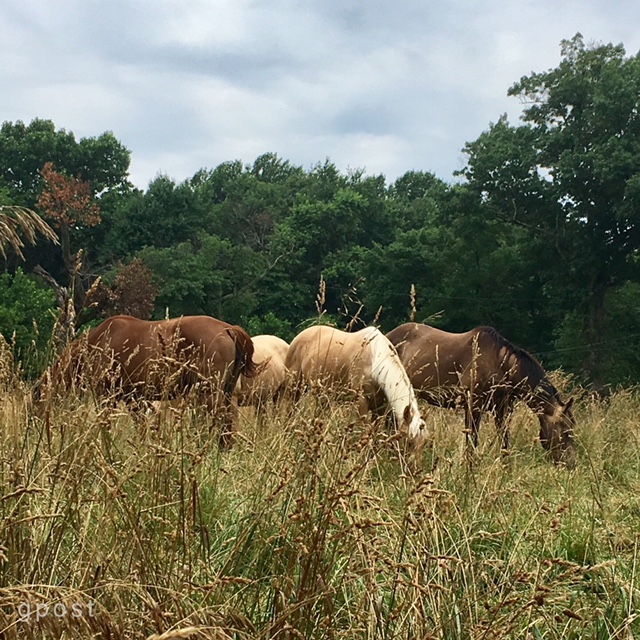
(This post was adapted from my July 15, 2018 Newsletter.)
